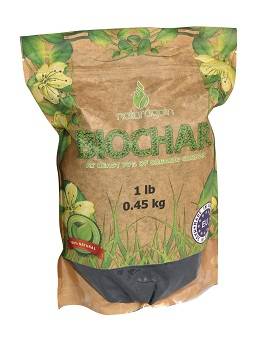It is made from biomass via pyrolysis and has a huge potential for helping mitigate climate change. Carbon present in biochar resists degradation and can store carbon in soils for hundreds, or even thousands of years. Why use biochar? The answer is simple. It offers multiple benefits to your garden and the climate. First of all, biochar boosts soil fertility and saves litres of water. It has been established that it changes soil acidity by increasing its pH, as a result of which microorganisms can start their colonies and encourage plant growth. Additionally, this pyrolysis by-product can be an important tool to increase cropland diversity in areas with severely depleted soils. It also improves the quality of water and decreases the amount of retaining agrochemicals and metals. As biochar traps moisture, more nutrients stay in the soil instead of leaching into groundwater and causing pollution. Moreover, it is potentially reducing growth of greenhouse gas levels and, therefore, has a huge impact on climate change. But… did you know that it has more to offer than just fertilizing the soil? Biochar is suitable for the production of energy as it can be used in any coal-based application. Being highly hygroscopic, it also acts as a water retention agent. Thanks to its porous structure and ability to attract and retain water, it is a highly desirable soil amendment. In practice, this means that all nutrients, phosphorus and agrochemicals are retained to a plant’s benefit. With biochar your crops as well as Mother Nature will be healthier as much less fertilizer will leach into the surface or groundwater. This natural soil amendment is also believed to prevent reforestation and reduce climate change. Last but not least, biomass production aimed at obtaining biochar is a carbon-negative process, which means that more CO 2 is removed from the atmosphere than released.
Application Rate: at a ratio of 1:5 or 1:10
Sustainability
The majority of sustainability programmes all over the world is focused on the management of gases and, more specifically, on what is directly pumped into the atmosphere. At first, let’s concentrate on the bigger picture. Replacing removed carbon means sequestering carbon that could have gone up into the atmosphere in a form of CO 2 , thus enabling natural processes in the soil. This simple solution helps us and our planet stay healthy by holding climate-changing emissions in our earth. When biochar is placed under the ground as a soil amendment, the systems becomes carbon negative. Moreover, carbon present in biochar is non-degradable, which signifies that it can store carbon in any soil for hundreds of years. As has been already mentioned, biochar is produced through pyrolysis, i.e. a process in which
biomass is exposed to high temperatures in the absence of oxygen. In addition to serving as a soil enhancer, sustainable biochar practices can produce oil and gas by-products, subsequently used as clean fuel, widely known as a renewable source of energy. It is more than likely that biochar and bioenergy will help combat global climate change by preventing
depletion of fossil fuel reserves. Additionally, they may reduce the emissions of nitrous oxide.
A plant’s growth draws down atmospheric CO 2 to produce biomass that contains carbon. Rather than allowing plant matter to decompose and emit CO 2 , pyrolysis transforms carbon from the plant tissue into a stable and inactive form of carbon. While photosynthesis removes CO 2 from the atmosphere, biochar stores carbon in a beneficial, solid form, thereby improving the soil quality and enabling your plants to grow better and bigger. Most
importantly though, it does not do any harm to the environment and reduces carbon footprints. It is worth highlighting that by using biochar in your garden, you can remove more CO 2 from the atmosphere than is released. And we owe everything to this amazing carbon-negative technology. Biochar is also known to reduce the emissions of other greenhouse gases from the soil, including methane. Yields rich in biochar are considered as real carbon sinks absorbing and storing atmospheric CO.
Join us and bury CO2 in the soil! Use BIOCHAR as an amendment to look how your plants grow bigger and stronger… and remember that small changes can make a huge difference.



